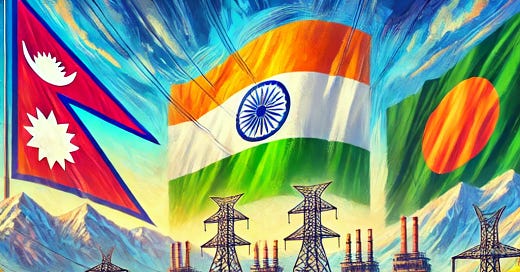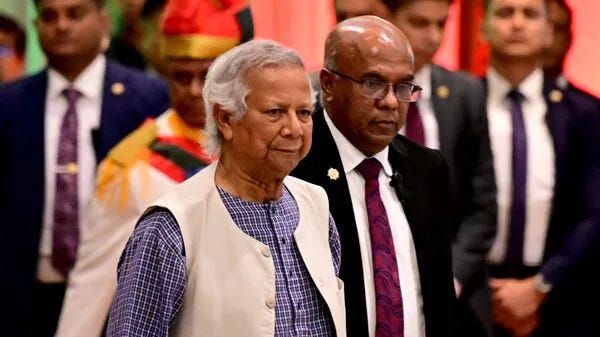Tripartite Power Sector Agreement between Nepal, India, and Bangladesh Signed.
Regime Change in Bangladesh: Indian Media's Misrepresentation of Bilateral Relations
Indian Media's Misrepresentation of Bilateral Relations
The signing of a 40 MW tripartite power agreement between India, Nepal, and Bangladesh today (3rd October, 2024) is a significant yet understated example of the strong ties between India and Bangladesh. In this agreement, India provides the critical transmission infrastructure that enables Nepal to export electricity to the power-deficit Bangladesh. While the quantity of power involved may seem small, the agreement underscores that Indo-Bangladeshi relations remain robust and functional, even amidst recent political developments and media speculation about strained ties.
Media’s Misrepresentation of the Regime Change in Bangladesh
The Indian media has inaccurately portrayed the recent regime change in Bangladesh, particularly in its coverage of the potential impact on bilateral relations. The recall of High Commissioner Mustafizur Rahman, Bangladesh’s envoy to India, along with four other ambassadors, including their Permanent Representative to the United Nations in New York, has added complexity to the situation. However, this has fuelled speculation about deteriorating ties, which overshadows the reality that diplomatic recalls are often routine and should not be conflated with major diplomatic rifts.
Despite these political shifts, key sectors such as energy cooperation continue to move forward, illustrating the durability of Indo-Bangladeshi relations. The recent tripartite power deal serves as a perfect example of this continuity. Regardless of political changes in Dhaka, the strategic foundations of cooperation between India and Bangladesh remain strong.
Key Highlights of the Tripartite Power Agreement
The landmark power sector agreement between Nepal, India, and Bangladesh symbolises growing regional cooperation in South Asia.
Details of the Agreement:
Parties Involved: Nepal Electricity Authority (NEA), NTPC Vidyut Vyapar Nigam Limited of India, and Bangladesh Power Development Board (BPDB).
Export Specifics: Nepal will export 40 MW of electricity to Bangladesh annually during the rainy season, from June 15 to November 15, amounting to an estimated 144,000 megawatt-hours.
Transmission Infrastructure: The electricity will be transmitted via the Dhalkebar-Muzaffarpur 400 kV transmission line, with the metering point in Muzaffarpur, India.
This agreement, although modest in terms of volume, is highly symbolic. It shows that the regional framework for cooperation, which has been built over years of engagement, remains intact and effective, despite any political turbulence in Bangladesh.
Diplomatic Recalls: A Routine Practice
The recall of Bangladesh’s High Commissioner to India, alongside other diplomatic appointments, has been exaggerated in Indian media coverage as a signal of deteriorating bilateral relations. In reality, such diplomatic actions are a standard procedure when governments undergo changes, especially during transitions of power. These recalls do not imply a breakdown in diplomatic relations but are rather a sign of internal adjustments.
While the media narrative has focused on these diplomatic movements as an indication of strained relations, this overlooks the deep, strategic ties that have been nurtured between India and Bangladesh over the years. From cross-border trade to infrastructure and security collaborations, the bilateral relationship has matured to withstand the vagaries of political changes.
Resilient Strategic Cooperation
Energy cooperation, particularly the tripartite agreement involving Nepal, highlights India's pivotal role in regional energy dynamics. India not only facilitated the deal but also provided essential transmission infrastructure for the electricity trade. This trilateral collaboration underscores India’s role as a regional connector, enhancing its relations with both Bangladesh and Nepal.
Beyond the energy sector, Indo-Bangladeshi cooperation extends to various long-term strategic projects. These include joint efforts in border management, counter-terrorism, and infrastructure development. These ties have been nurtured over decades and are not easily disrupted by changes in the political landscape.
The ongoing tripartite energy deal illustrates that both India and Bangladesh remain committed to fostering cooperation that benefits the region as a whole. It also highlights the broader potential for increased energy trade and greater integration of South Asia’s power grid, positioning the region for enhanced energy security.
Stability Amidst Change
While political changes in Bangladesh may raise short-term uncertainties, they do not undermine the core of the India-Bangladesh relationship. The media's portrayal of the regime change as a major threat to bilateral ties is exaggerated. In reality, Bangladesh’s new leadership, like its predecessors, is likely to maintain a pragmatic approach towards India, driven by mutual interests in security, trade, and regional stability.
The continuation of critical projects such as the power agreement demonstrates that both nations understand the importance of long-term cooperation. Furthermore, these strategic projects serve as a buffer against any potential diplomatic hiccups, ensuring that the partnership remains resilient.
Summing Up
The regime change in Bangladesh has been inaccurately portrayed in the Indian media as a potential destabilising factor in Indo-Bangladeshi relations. However, the signing of the tripartite power sector agreement between Nepal, India, and Bangladesh illustrates that the core of this bilateral relationship remains strong. Strategic cooperation in energy and infrastructure continues, showcasing the durability of ties that have been carefully built over time.
In South Asia’s evolving political landscape, it is essential to approach diplomatic developments with nuance. While media coverage may amplify the significance of routine diplomatic moves, the reality is that India and Bangladesh remain committed to their shared goals. Long-standing partnerships in key sectors, such as energy, will continue to anchor bilateral relations, regardless of political transitions in either country. The strength of this cooperation ensures that both nations will remain strategic allies, working together for regional progress and stability.
Indian Priorities
From India’s perspective, Bangladesh's cooperation is crucial in several key areas that directly impact India's strategic interests. Bangladesh is expected to play an active role in assisting India by flushing out anti-India insurgents operating from their territory, which is vital for India’s internal security, particularly in the northeastern states. Additionally, Bangladesh’s role in providing access corridors for Indian railways and power transmission across its territory is fundamental to fostering greater connectivity and energy security in the region. Continued collaboration on these fronts is essential for maintaining the momentum of bilateral ties, reinforcing the strategic partnership that benefits both nations, and contributing to broader regional stability and development1.
Regime Change in Bangladesh: National Security and Developmental Implications for India
Regime Change in Bangladesh: Implications for India





